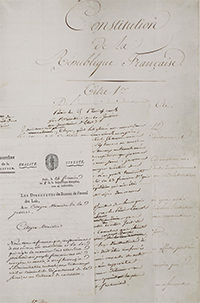The Consulate: France's Government 1800–1804
Part 1: Formation The Consulate was the French form of government in between the Directory and the Empire, running 1800–1804. Dominating the government was Napoleon Bonaparte, who served as First Consul. 
The Constitution of Year Ⅷ had in 1799 established yet another new government for France. The legislature in this new government, termed the Consulate, was three houses: a Senate (whose members served for life), a Tribunate, a Legislative Body, and a Council of State; membership of the three was 80, 100, and 300, respectively. The Tribunate and Legislative Body were to meet in public; the Senate meetings could not be public. Another parliamentary assembly on the same level of hierarchy was the Council of State, which drafted laws. Heading the government were three Consuls, the First of whom held most of the reins of government. Notably, this Constitution did not contain a Declaration of Rights. 
The Constitution actually named the first three consuls: "The constitution appoints as First Consul, Citizen Bonaparte, former provisional consul; as Second Consul, Citizen [Jean Jacques Régis de] Cambacérès, former minister of justice: and as Third Consul, Citizen [Charles-François] Lebrun, former member of the commission of the Council of Ancients." However, the Constitution also made clear who of those three had the most power: "The First Consul promulgates the laws; he appoints and dismisses at will the members of the Council of State, the ministers, the ambassadors and other foreign agents of high rank, the officers of the army and navy, the members of the local administrations, and the commissioners of the government before the tribunals. He appoints all criminal and civil judges other than the justices of the peace and the judges of cassation, without power to remove them." The Constitution delineated a judiciary, consisting of justices of the peace, who served three-year terms, and judges, who served for life. In practice, the Consuls, as the executive branch, ran the government. The First Consul was the one "who promulgates the laws." The Tribunate could debate proposed laws but could not vote on them. The particulars of those debates accompanied a proposed law to the Legislative Body, which could pass or vote down laws but could not discuss or change them. The Senate reviewed draft bills in order to inform the First Consul fully on the potential results of such laws. It was up the First Consul, then, to declare proposed laws in effect or dead letters. |
|
Social Studies for Kids
copyright 2002–2025
David White




